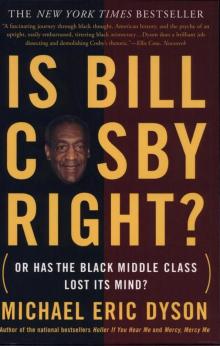Michael Eric Dyson 

by Is Bill Cosby Right?: Or Has the Black Middle Class Lost Its Mind?
Genre: Other9
Published: 2005
View: 597
Read OnlineRead Michael Eric Dyson Storyline:
From Publishers WeeklyLast May, iconic comedian Cosby raised a storm with a dyspeptic rant about the self-destructive failures of the black underclass: "knuckleheads" without parents who "put their clothes on backward," speak bad English and go to jail. To pop culture intellectual Dyson—author of books on Marvin Gaye, Tupac Shakur and Martin Luther King Jr.—this was the most blatant manifestation of an attitude shared by the "Afristocracy." With empathy and energy, Dyson takes Cosby at his word and dissects his arguments—as well as the comedian's own conduct—in order to combat Afristocratic dogma. While Dyson is merciless in assessing both, he takes the opportunity to explore a host of hot-button issues in black culture, from illegitimacy to faux African names, citing data and making his own case for black culture as adapted to a dominant white society that systematically puts up barriers to opportunity. The prolific Dyson has already generated controversy with what finally amounts to an evisceration of a major black figure, but that seems to be precisely the point. Despite the specificity and ferocity of Dyson's critique (which draws on allegations that Cosby sexually abused a woman and fathered an illegitimate child, and understates the race politics of The Cosby Show), Cosby ends up more of a straw man than take-down victim, as Dyson celebrates the "persistent freedom of black folk." *12-city author tour; 40-city radio satellite tour. (May) * Copyright © Reed Business Information, a division of Reed Elsevier Inc. All rights reserved. From BooklistWhen Bill Cosby, iconic figure of American fatherhood, began criticizing the child-raising attributes of the black urban poor, he provoked a storm of discussion within the black community. Dyson places the comedian in the tradition of black elites, referred to as "Afristocrats," who were highly critical of poor blacks for making the race look bad in front of white folks. Dyson's real strength is in explaining some of the social factors that contribute to the actions of the poor. Dyson critiques the changes within Cosby himself, a man whose great insights on the social causes of black poverty made him comforting to whites and comfortable with whites. Dyson critiques Cosby's own failures at parenting: one daughter who fell victim to drug abuse, and another daughter, born of an extramarital affair, whom he supported but later charged with extortion. Dyson is thorough and places Cosby in check, but his book still begs for discussion of the consequences of social dysfunctionality beyond historical repetition and the imperfections of America's most popular race-neutral dad. Vernon FordCopyright © American Library Association. All rights reservedPages of Michael Eric Dyson :